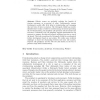Free Online Productivity Tools
i2Speak
i2Symbol
i2OCR
iTex2Img
iWeb2Print
iWeb2Shot
i2Type
iPdf2Split
iPdf2Merge
i2Bopomofo
i2Arabic
i2Style
i2Image
i2PDF
iLatex2Rtf
Sci2ools
109
click to vote
ICWE
2010
Springer
2010
Springer
Script Programmers as Value Co-creators
Website owners are gradually realising the benets of viewing customers as co-creators of value. Unfortunately, current development models oer little help in understanding and managing this new form of value co-creation. The Metropolis Model has recently identied three realms of roles for crowdsourcing: the kernel (providing the core functionality), the periphery (the partners) and the masses (the end users). Technically wise, the periphery requires mechanisms for the commons to suggest, develop and maintain additional services on top of the kernel. This work concretizes the Metropolis Model for crowdsourced website development based on user scripts. We outline some technical challenges to foster the relationship between end users (the masses), scripters (the periphery) and the web site (the kernel) on the way to promote script-based crowdsourcing. Key words: Greasemonkey, JavaScript, Crowdsourcing, Web2.0
| Added | 04 Mar 2011 |
| Updated | 04 Mar 2011 |
| Type | Journal |
| Year | 2010 |
| Where | ICWE |
| Authors | Cristóbal Arellano, Oscar Díaz, Jon Iturrioz |
Comments (0)

